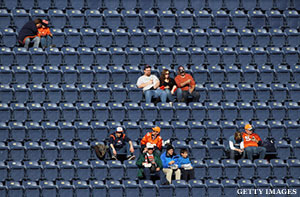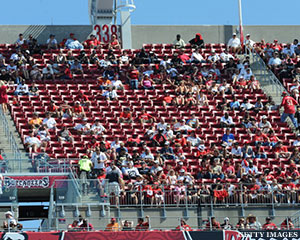
By Jason Notte
The Street
Now that NFL fans and commentators are done throwing their temper tantrum about replacement refs, can we get some games televised?
The NFL's regular referees returned more than a week ago after the entire football-watching world had itself a good cry over the "fraud" being perpetuated on fans, the atrocities of subjective penalty calling and such high-minded notions as the integrity of the game. Fans in the San Diego and Tampa/St. Petersburg areas would have joined them, but they were too busy watching some other market's game while their home team was busy being booted off television for insufficient attendance.
That's the order of march in today's NFL average-joe replacement refs missing a few calls early in the season? Can 'em and pay the regular refs immediately. But average-Joe fans can't watch a game in their area when lofty ticket prices and a floundering economy keep them away from stadiums their tax dollars paid for? Forget 'em. Let the bums buy a ticket if they want an NFL team.
While some say an NFL market missing a broadcast may not seem as important to some fans as, say, a questionable call over mutual possession, NFL blackouts have the potential to affect the pro sports landscape far more deeply that a few weeks of replacement officiating. Here are just five reasons why the NFL and its fans should turn their attention to the blackout issue immediately:

1. The NFL's answer isn't working: For much of the blackout rule's existence, an NFL team's home game was blacked out when it didn't sell out a game 72 hours before kickoff. This year, the NFL gave teams the option of reducing the blackout ceiling to 85 percent of total capacity, with any revenue from tickets sold above that margin going into a collective pot to be split among all teams.
The San Diego Chargers, a team prone to blacking out home games in recent years, opted to decline the NFL's offer and wound up blacking out a home game against the Atlanta Falcons two weeks ago at Qualcomm Stadium when both teams were 2-0.
Even teams that took up the NFL's offer have had to black out games this year. The Tampa Bay Buccaneers have blacked out two games thanks to the tough math required to reach 85 percent capacity.
2. The blackouts themselves aren't working: After spending two seasons with much of the home slate blacked out, fans in Tampa seem just fine with keeping the team of billionaire owner Malcolm Glazer (pictured below) team off local airwaves while he tinkers with Machester United and takes $15 million for 30 years from taxpayers to maintain Tampa's Raymond James Stadium. In the words of the folks at SportsFans.org, "The Bucs owners either 1) don't actually care about their fans or 2) don't realize that they're only exacerbating the waning interest in their team by continuing to black out game after game or 3) both."
It's a similar situation in San Diego, where billionaire owner Alex Spanos wants a new facility but spurned the new NFL blackout policy that would keep home games on air. Fans are OK with paying to watch a game, but professional stadium politics isn't that game.

3. Blackouts = blackmail: Why didn't the Chargers embrace the NFL's lower blackout threshold? Let team spokesman Bill Johnson explain, as he did to NFL San Diego this year:
"Lowering the benchmark to 85 percent would substantially impact our ticket revenues. A team like the Chargers, whose revenues are already limited by an older, antiquated stadium, can't afford to lose such an import revenue stream."
Did you catch that? San Diego's blackouts are the stadium's fault and it's the taxpayer's fault for not giving the team the shiny new plaything it wants. Buffalo has taken a similar stance on desired improvements to Ralph Wilson Stadium, saying the hundreds of millions in renovations are necessary to update a stadium where attendance isn't what it used to be. Both franchises have had no problem blacking out local fans in recent years and each has openly flirted with other towns -- the Chargers with L.A. and Chula Vista and the Bills with Toronto. The not so subtle message is that if taxpayers don't pony up, the team is gone. It's a move that worked without blackouts in Minnesota earlier this year, but blackouts don't seem to have changed many minds in the aforementioned blackout markets.
4. The league is now blacking out paying customers: Fans have already petitioned the Federal Communications Commission to make it reconsider cable and satellite television's blackout rules, but just about every fan pays into the television infrastructure the NFL uses. Not only do their taxes maintain public airwaves, but their cable and satellite fees support ESPN, the NFL Network and other channels that show local teams. Perhaps the strongest argument comes from fans who pay hundreds of dollars a year for DirecTV's Sunday Ticket and still can't watch blacked-out local games. When the argument changes from "Cough it up, cheapskate" to "Cough up some more, cheapskate," you're treading the fine line between commerce and extortion.

5. It's about to get far worse: Since the mid-'90s, Los Angeles lay fallow as an NFL city. Promises to move a team there have been as empty as Los Angeles Coliseum on an NFL Sunday.
Now, thanks to the Los Angeles City Council, every small-market NFL team's nightmare is now a reality. Last month the council unanimously approved plans to build a $1.5 billion stadium in downtown Los Angeles, which means owners complaining about old stadiums in San Diego, St. Louis and Buffalo or worried about delicate attendance figures in Jacksonville now have a boogeyman to frighten the faithful into compliance.
"We're not trying to steal a franchise and we're not trying to force them to move before they make a decision to move," Tim Leiweke, CEO of Anschutz Entertainment Group, the company behind the project, told ESPN. "That's up to the individual owners out there today. But we will be very active in letting them know, despite what a lot of people thought, we have a deal with the city, we've gone through this process and we are shovel-ready."
The problem is that tactic doesn't always work. Los Angeles is the only market the NFL has completely abandoned since the Portsmouth Spartans left Ohio in 1934. The NFL doesn't like losing markets of any size and any move will likely leave a temporary vacancy. Just because a market's fans can't support a team during a down economy doesn't mean they won't pack the place when it inevitably bounces back.
More From The Street:
-- 7 Apps You're Going to Need This Football Season
-- 5 Best Cars Under $15,000








